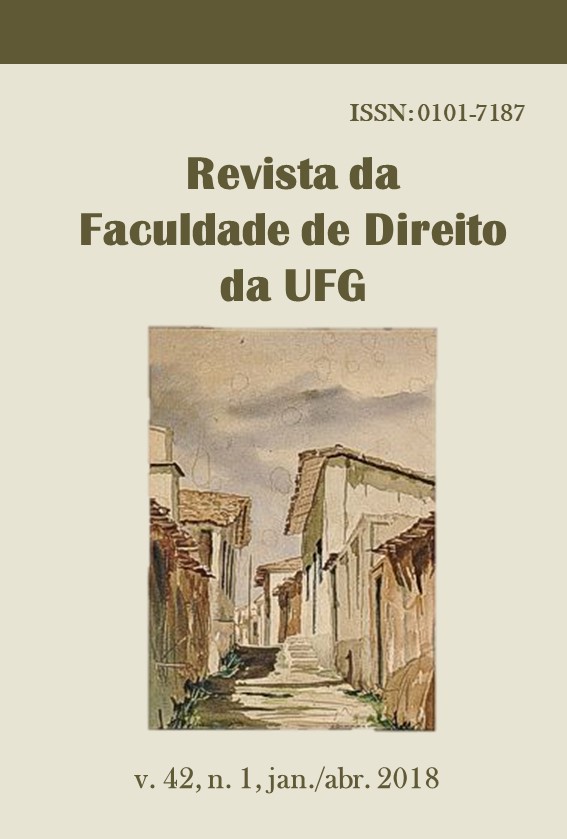Direito, interculturalidade, tradução e emancipação: um diálogo com Boaventura de Souza Santos e Aroso Linhares
DOI :
https://doi.org/10.5216/rfd.v42i1.52734Mots-clés :
Emancipação, Interculturalidade, Ontologia e Teleologia do Direito, TraduçãoRésumé
Na atualidade das dinâmicas sociais, têm-se verificado um notório contexto de prostração do direito diante de instâncias outras, como a política e a economia, especialmente no Brasil, e tal fenômeno traz consigo o perigo de esvaziamento e fragilização do Direito. Diante disso, o presente artigo propõe-se a analisar a ontologia e a teleologia do direito, sob uma perspectiva de interculturalidade, tradução e emancipação, a fim de perfilhar, com mais nitidez, o que é o direito e o que o mesmo busca implementar. Para tanto, o trabalho fará uma revisão bibliográfica, com referencial teórico nas obras de Boaventura de Souza Santos e José Manuel Aroso Linhares. Com a obra de Boaventura, abordar-se-á a teleologia do direito, compreendida como emancipação, ao passo que a obra de Aroso Linhares tratará da ontologia do direito, compreendido como uma experiência cultural, um projeto culturalmente situado. Na Ontologia do Direito, o artigo analisará as possibilidades de o direito resolver a questão da interculturalidade, construindo “consensos possíveis”, ideia essa que se confunde com a própria ideia de justiça. Na teleologia do direito, o artigo analisará como o direito deverá encarar os diversos tipos de exclusão/fascismos, para alcançar seu objetivo de emancipação. Na sequência, aborda-se a tradução, enquanto método e essência do direito e possível instância realizadora do diálogo intercultural. Por fim, a conclusão alcançada pelo artigo pede que se leve o direito a sério na sua função de interlocutor culturalmente possível, devendo ser respeitada sua autonomia e essência, a fim de que esse mesmo direito viabilize um esforço de tradução, como experiência continuada, não estática, livre de conceitos universais.
Abstract
In the current social dynamics, there has been a notorious context of prostration of law before other instances, such as politics and economics, especially in Brazil, and this phenomenon carries the danger of emptying and weakening the law. Therefore, the present article proposes to analyze the ontology and the teleology of the law, from a perspective of interculturality, translation and emancipation, in order to sharpen more clearly what is the law and what it seeks to implement. For this, this paper will make a bibliographical review, with theoretical reference in the works of Boaventura de Souza Santos and José Manuel Aroso Linhares. With the work of Boaventura, the teleology of law, understood as emancipation, will be approached, while the work of Aroso Linhares will deal with the ontology of law, understood as a cultural experience, a culturally situated project. In the Ontology of Law, the article will analyze the possibilities of the law to solve the question of interculturality, constructing "possible consensuses", an idea that is similar to the idea of justice. In the teleology of law, this paper will analyze how the law should face the various types of exclusion / fascism, to achieve its goal of emancipation. Following, this paper will adress the translation, as method and substance of the law and a possible forum for intercultural dialogue. Finally, the conclusion reached by the article calls for the law to be taken seriously in its role as a culturally possible interlocutor, and its autonomy and essence must be respected, so that the same law enables a translation effort, as a continuous experience, not static, free of universal concepts.
Téléchargements
Références
AROSO LINHARES, José Manuel. Direito, Violência e Tradução: Poderá o Direito, enquanto forma de vida civilizacionalmente situada, oferecer-nos as condições de tercialidade exigidas pelo problema do diálogo intercultural? Revista Themis, ano XV, nº 26/27, 2014, p. 57.
AROSO LINHARES, Jose Manuel de. Lições de Teoria do Direito, 2009. Constelação de discursos ou sobreposição de comunidades interpretativas? A caixa negra do pensamento jurídico contemporâneo, Porto, Edição do Instituto da Conferência, Março, 2009.
PANIKKAR, Raimond. Paz e interculturalidad. Una reflexión filosofica. Barcelona: Herder Editorial, 2006
RESTREPO, Ricardo Sanín. Teoría crítica constitucional: Rescatando la democracia del liberalismo. Quito: Corte Constitucional de Ecuador, 2011
SANCHEZ RUBIO, David. Encantos y desencantos de los derechos humanos. De Emancipaciones, liberaciones y dominaciones. Barcelona: Icaria Antrazyt Editoriales, 2011.
SANTOS, Boaventura Sousa. Poderá o Direito ser Emancipatório? Revista Crítica de Ciências Sociais. Número 65, maio de 2003.
TAPIA, Luis. Pensando la democracia geopoliticamente. La Paz: Muela del Diablo Editores, 2009.
Téléchargements
Publié-e
Comment citer
Numéro
Rubrique
Licence
Les auteurs qui publient dans cette revue accordent à Revista da Faculdade de Direito da UFG une licence mondiale libre de droits, soumise aux termes et conditions de la Creative Commons Attribution 3.0 Brasil Legal License Creative Commons Attribution License
Les auteurs concèdent à RFD UFG tous les droits d'auteur sur les articles qui y sont publiés, qui les conservent en exclusivité jusqu'à l'avènement du domaine public sur ceux-ci.
























